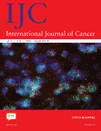Detection of mitochondrial deoxyribonucleic acid alterations in urine from urothelial cell carcinoma patients
Abstract
Our study aims at understanding the timing and nature of mitochondrial deoxyribonucleic acid (mtDNA) alterations in urothelial cell carcinoma (UCC) and their detection in urine sediments. The entire 16.5 kb mitochondrial genome was sequenced in matched normal lymphocytes, tumor and urine sediments from 31 UCC patients and compared to different clinical stages and histological grades. The mtDNA content index was examined in all the specimens. Sixty-five percent (20/31) of the patients harbored at least 1 somatic mtDNA mutation. A total of 25 somatic mtDNA mutations were detected, which were more frequent in the respiratory complex coding regions (Complex I, III, IV and V) of the mtDNA and significantly affected respiratory Complex III compared to the other complexes (p = 0.021–0.039). Compared to Stage Ta, mtDNA mutation was higher in Stage T1 and significantly higher in Stage T2 (p = 0.01) patients. MtDNA mutation was also significantly higher (p = 0.04) in Stage T2 compared to Stage T1 patients. Ninety percent (18/20) of the patients harboring mtDNA mutation in the tumor also had mutation in their urine sediments. Eighty percent (20/25) of the tumor-associated mtDNA mutations was detectable in the urine sediments. Compared to the normal lymphocytes, the mtDNA content increased significantly in the tumor (p = 0.0013) and corresponding urine sediments (p = 0.0025) in 19/25 (76%) patients analyzed. Our results indicate that mtDNA alterations occur frequently in progressive stages of UCC patients and are readily detectable in the urine sediments. MtDNA mutations appear to provide a promising tool for developing early detection and monitoring strategies for UCC patients.




